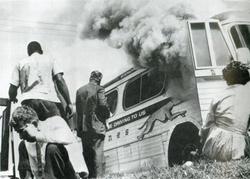VOICES: Where are the personal apologies for the Freedom Riders?
 By Kung Li
By Kung Li
The 50th anniversary of the Freedom Rides generated a burst -- however brief -- of remembrance. There was Oprah Winfrey's gala show on May 4, commemorating the day the southbound Greyhound and Trailways buses pulled out of Washington, D.C. A few weeks later, a large group of Freedom Riders gathered in Jackson, Miss. at the invitation of Gov. Haley Barbour, surrounded by reporters eager to watch the interaction between the Freedom Riders and a man who had a few months earlier said about segregation, "I just don't remember it being that bad."
Gov. Barbour started out well, with an apology to the Freedom Riders that was both direct and unambiguous. "We apologize to you for your mistreatment in 1961," he said, "and we appreciate this chance for atonement and reconciliation." But then he spent the next two minutes thanking the corporate sponsors of the event, confirming suspicions that his apology -- and indeed, the entire reunion event -- was grounded more in political strategy than personal regret.
A genuine apology feels risky, because it must acknowledge wrongdoing. Personal apologies are especially fraught, requiring the person who did wrong to say sorry to the person he or she has harmed. Toss race into the mix, and things get sticky indeed.
It took the U.S. House and Senate 144 years after the legal end of chattel slavery to issue an apology. Some Southern states have issued apologies. Others, including my home state Georgia, have not. An official apology is better than no apology, but it's not a personal apology. And, of course, no personal apologies are possible so long after the fact.
Personal apologies are possible, though, by the white Southerners who behaved so badly during the Freedom Rides. History has made note of the names of those who endured the beatings, but has chosen not to name the individuals who did the beatings. In Montgomery, among the 500 men and women who flooded the Greyhound bus terminal, who was it that knocked out Jim Kwerg's teeth? What is the name of the man who slammed a wooden crate down on John Lewis' head? Who were the men who took offense at Justice Department official John Seigenthaler stepping in to stop the attacks on two women, and registered their dissatisfaction by beating Seigenthaler unconscious? The mob grew to over 1,000 people that day, and without enough Freedom Riders to attack, turned their pipes and broken bottles to any African American on Montgomery's streets.
Out of that thousand-person mob, hundreds are still living. They can still apologize.
Yet, they have not. Nor has not been a single apology from the people in the 40 cars that chased the Greyhound out of Anniston, the young man who threw the firebomb into the bus, or the men who beat Freedom Riders with lead pipes and wooden bats as they stumbled out of the burning bus. None of the prison guards at Mississippi's Parchman Farm have apologized for their brutal treatment of the Freedom Riders sent there to be broken.
There has been only a single personal apology for the events that happened 50 years ago. Elwin Wilson, a former member of the KKK, drew the first blood of the Freedom Ride when he attacked John Lewis as he stepped into the bus station in Rock Hill, S.C. He traveled to Washington, D.C. in 2009 to find John Lewis -- now Congressman Lewis -- and to tell him he was sorry.
Congressman Lewis described the meeting to Oprah like this: "He said, 'I attacked you, and I'm sorry. I want to apologize. Will you accept my apology?' And I said, 'Yes.' And he gave me a hug, and he started crying. I hugged him back, and I shed some tears also."
"He's the first and only person who has ever apologized to me."
Wilson does not say why he waited almost 50 years, but when he finally had the courage to say he was sorry, he was able to do so face to face because the man he needed to apologize to is a Congressman, with a public address in Washington, D.C. How many of the sheriffs' deputies and prison guards, or the men and women who had been part of the Montgomery and Anniston mobs, would do the same thing if they had a forum for doing so?
Maybe none, but maybe some.
Gov. Haley's invitation of the Freedom Riders to return to Jackson was good for his image and will be good for the state's tourism business. It was a lost opportunity, however, for him to not ask that those white Southerners who were sorry for what they had done, to come forward and say so, face to face.
(Photo of the Freedom Riders' bus burning near Anniston, Ala. in 1961.)